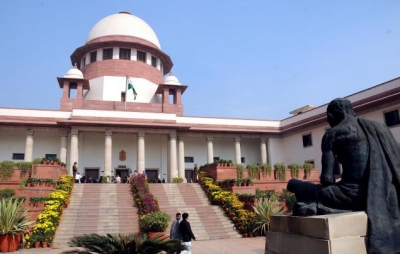New Delhi, Aug 25 : The Supreme Court on Thursday agreed to review its July 27 PMLA ruling, which confirmed the Enforcement Directorate’s authority in relation with the attachment of property that are involved in money laundering, as well as arrest search, seizing, and detention in accordance with the Prevention of Money Laundering Act.A bench led by Chief Justice N.V.Ramana, said there are two main concernsthe non-provision of ECIR to the accused during the point of arrest, and the disproving of the presumption of innocence.The Supreme Court issued a notice to the Central government regarding the petition to review submitted by Congress MP Karti Chidambaram.
Senior lawyers Kapil Sibal and A.M.Singhvi submitted that the entire decision must be reviewed.However, the highest court clarified two issues that will be considered in the review.Solicitor General Tushar Mehta submitted that review is different from a writ petition and that all issues cannot be reviewed.
The Supreme Court said there was no need for an lengthy hearings, and the court believes there are two factors that are required in the ruling to be re-examined.”We are in total support of the fight against the use of illegal money.The country is not able to afford such crimes because the goal is good,” said the top court.
The bench, which also includes justices Dinesh Maheshwari and C.T.Ravikumar added that the judges are of two elements that need an re-look in the decision.
Opposing the review Mehta stated that there must be an error that is evident on the records for review and this isn’t an independent act, but it is in accordance with India’s international obligations.
Sibal representing Karti Chidambaram, stated that the court’s decision is that money laundering is a continuous crime, therefore the proceeds of 1999 could be considered an offence even if it wasn’t an offence that was scheduled in 1999.
He said that the question is whether an individual can be prosecuted on the basis of concealing the proceeds of the crime.
The bench reiterated that it had evidently identified two issues – related to ECIR and the negation of the presumption of innocence.
Sibal requested that the bench reconsider the whole decision however, the bench was not influenced by the arguments of Sibal and stated that it was restricting the review based on two reasons.
After hearing the submissions after hearing submissions, the bench issued notice of the review petitions and also extended the order to grant temporary protection to petitioner by four weeks.
Just 27, the highest court has affirmed the strict requirements of Prevention of Money Laundering Act (PMLA) in connection with the definition of proceeds of criminal activity, power of arrest, search and seizure and attachment of properties, and the two bail conditions.
A bench that was headed by Justice A.M.Khanwilkar (now retired) and comprised of Justices Maheshwari and Ravikumar was quoted as saying: “The international bodies have been discussing the issue of money laundering on a a regular basis for a long time.They strongly urged the enactment of strict laws to stop the spread of money laundering as well as dealing with the dangers of it, including the prosecution of those who perpetrate it and to secure and confiscation of the proceeds of criminal activity that has direct consequences for the financial system and the integrity and sovereignty of the nations.”
It was added that money laundering is among of the most heinous crimes which is not just detrimental to the economic and social structure of the country but also has the potential to spread other heinous crimes such as terrorist acts, crimes that are related to NDPS Act, etc.
The supreme court had upheld the legality of Sections 5 (attachment of property), 8(4) (taking possession of attached property),3 (definition of money laundering) 17 (search and seizure) 18 (search of persons), 19 (powers of arrest), 24 (reverse obligation of evidence) 45 (offences that are cognisable and non-bailable and two conditions for the grant of bail by the court) 50 (statements sent to ED officials) and 44 (offences that can be ruled out by a the special court).
However, the Supreme Court left open the question of whether some of the changes to the PMLA 2002 could not be enacted by Parliament in the form of an Finance Act, to be reviewed by a bigger bench.
ss/vd







